Trees and Houses, c.1885 Paul Cezanne (1839-1906)
Location: Musee de l'Orangerie Paris FranceOriginal Size: 54 x 73 cm
Own a museum-quality reproduction of Trees and Houses by Cezanne (c.1885), exclusively hand-painted in oils on linen canvas by European artists with academic training. Each masterpiece is created with meticulous craftsmanship, capturing the exceptional quality and authentic brushwork of the original painting.
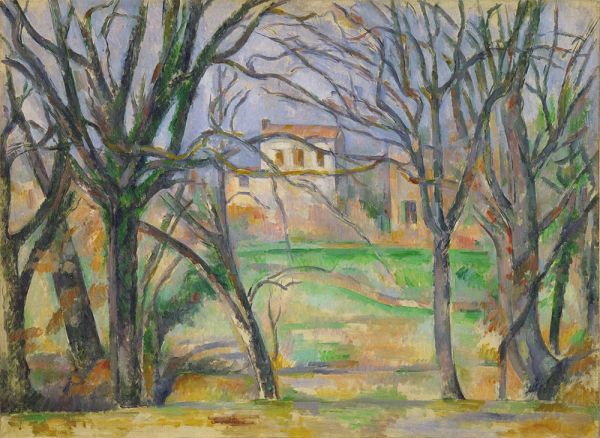
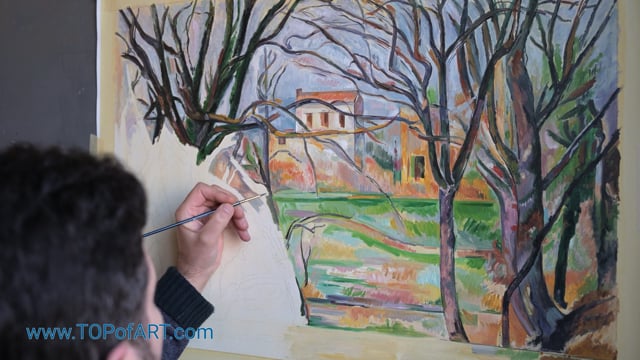 Trees and Houses - Video
Trees and Houses - Video
A Glimpse into Our Studio: Creating Museum-Quality Oil Painting Reproductions
Watch a video showcasing the creation of a hand-painted reproduction of Trees and Houses by Cezanne in our TOPofART studio. Witness the step-by-step process as our artists bring this masterpiece to life.
Oil Painting Reproduction
If you want a different size than the offered
Description
Painted by European Аrtists with Academic Education
Museum Quality
+ 4 cm (1.6") Margins for Stretching
Creation Time: 8-9 Weeks
Creation Process
We create our paintings with museum quality and covering the highest academic standards. Once we get your order, it will be entirely hand-painted with oil on canvas. All the materials we use are the highest level, being totally artist graded painting materials and linen canvas.
We will add 1.6" (4 cm) additional blank canvas all over the painting for stretching.
High quality and detailing in every inch are time consuming. The reproduction of Paul Cezanne also needs time to dry in order to be completely ready for shipping, as this is crucial to not be damaged during transportation.
Based on the size, level of detail and complexity we need 8-9 weeks to complete the process.
In case the delivery date needs to be extended in time, or we are overloaded with requests, there will be an email sent to you sharing the new timelines of production and delivery.
TOPofART wants to remind you to keep patient, in order to get you the highest quality, being our mission to fulfill your expectations.
We not stretch and frame our oil paintings due to several reasons:
Painting reproduction is a high quality expensive product, which we cannot risk to damage by sending it being stretched.
Also, there are postal restrictions, regarding the size of the shipment.
Additionally, due to the dimensions of the stretched canvas, the shipment price may exceed the price of the product itself.
You can stretch and frame your painting in your local frame-shop.
Delivery
Once the painting Trees and Houses is ready and dry, it will be shipped to your delivery address. The canvas will be rolled-up in a secure postal tube.
We offer free shipping as well as paid express transportation services.
After adding your artwork to the shopping cart, you will be able to check the delivery price using the Estimate Shipping and Tax tool.
Museum Quality
The paintings we create are only of museum quality. Our academy graduated artists will never allow a compromise in the quality and detail of the ordered painting. TOPofART do not work, and will never allow ourselves to work with low quality studios from the Far East. We are based in Europe, and quality is our highest priority.
Additional Information
The chromatic range is restrained yet richly modulated. Earthy umbers, olive greens and dusty ochres mingle with quick flashes of verdant grass that suggest early spring stirring beneath wintry boughs. Cézanne’s colour, laid in short, angled strokes, seems less intent on mimetic description than on registering shifting sensations of light. Touches of vermilion flicker at the tree bases, while a wash of blue-grey gives the air its tangible coolness. The overall effect is one of subdued vibrancy: separate tones breathe against one another without merging, allowing the eye to linger on their subtle negotiations.
Brushwork here is both analytical and sensuous. Cézanne builds form by stacking oblique, parallel touches, compressing and expanding pigment to model trunks, walls and patches of ground. Paint is applied thinly in places, densely in others, creating an irregular rhythm that echoes the irregularity of nature itself. The surface holds a quiet tension: strokes remain visible, yet they congeal into a coherent optical mass, a reminder of the artist’s conviction that perception is constructed, not merely received.
Compositionally, the picture pivots on a delicate equilibrium of vertical, horizontal and diagonal forces. The trees form a dark scaffolding that divides the canvas into interlocking planes; through their apertures, the farmhouse is centred yet refuses to dominate. Perspective is deliberately loosened—the middle distance flattens toward the foreground—so that space becomes a mosaic of overlapping fragments. Cézanne guides the gaze in gentle zigzags, encouraging one to oscillate between the tactile immediacy of the trees and the distant, almost schematic architecture.
Painted circa 1885, during the artist’s intensive explorations around Le Jas de Bouffan, the work records a dialogue with his Impressionist mentor Pissarro while anticipating the structural investigations of Cubism. The motif—revisited in versions now in New York and Oslo—permits Cézanne to test how natural geometry might replace conventional perspective. What emerges is less a descriptive landscape than a meditation on seeing: a measured, quietly radical attempt to reconcile the permanence of place with the fugitive nature of sight.
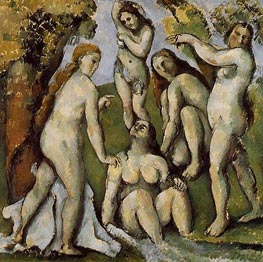
Five Bathers c.1885/87
$724
$66.00
Paul Cezanne
Original Size:65.5 x 65.5 cm
Kunstmuseum, Basel, Switzerland
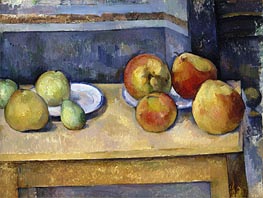
Still Life - Apples and Pears c.1885/87
$705
$75.12
Paul Cezanne
Original Size:44.8 x 58.7 cm
Metropolitan Museum of Art, New York, USA
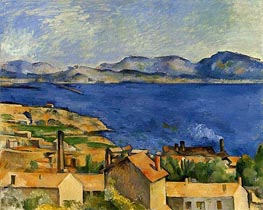
The Gulf of Marseille Seen from L'Estaque c.1885
$946
$79.66
Paul Cezanne
Original Size:80.2 x 100.6 cm
Art Institute of Chicago, Illinois, USA
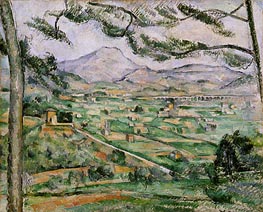
Mont Sainte-Victoire with Large Pine c.1886/87
$817
$137.35
Paul Cezanne
Original Size:59.7 x 72.4 cm
Phillips Collection, Washington, USA
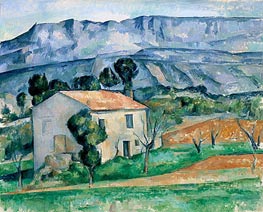
House in Provence c.1886/90
$853
$80.93
Paul Cezanne
Original Size:64.7 x 81 cm
Indianapolis Museum of Art, Indiana, USA